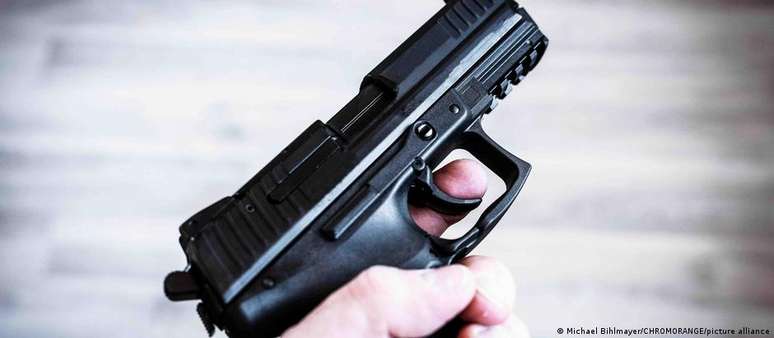Analysis by the Fogo Cruzado Institute shows that parliamentarians who support arming the population dominate the debate in the field of public safety. The mobilization in favor of the use of firearms by Brazilians remains active in the National Congress. In the first year of the current government of Luiz Inácio Lula da Silva, the number of speeches in favor of armaments exceeded three times those in favor of gun control. Of the 50 parliamentarians who used the platform to speak on the subject, 36 advocated the release of weapons.
The investigation is part of a report produced by the Instituto Fogo Cruzado, a Rio de Janeiro-based organization that monitors the country’s armed violence landscape. The group carefully examined the speeches of parliamentarians in office between 1951 and 2023.
“There seems to be a tendency in the pro-control camp to believe that the agenda has been pacified. But there is a broad debate. The pro-armament camp has a clear objective, a specific program, which is to overturn the decrees issued by the Lula government,” analyzes sociologist Íris Rosa, one of the researchers responsible for the investigation.
When Lula assumed his third term in 2023, he revoked several decrees signed by Jair Bolsonaro in this area of public safety. The former president had loosened the rules to facilitate and expand the population’s access to weapons and ammunition.
Congress seemed to passively observe the changes. Since most decisions were made by presidential decree, without the participation of the Legislature, the Fogo Cruzado Institute decided to investigate the position of the parliamentarians. And the agenda should be highlighted in the coming months, given that it is an election year.
“Many sectors believed that the decrees issued by the Lula government in the first year of this mandate would be enough to cool the debate. But, analyzing the speeches given in 2023, this is far from having happened,” says Rosa.
The development of the speech
The investigation analyzed the databases of the Chamber of Deputies and the Senate starting from 1951, the year in which the first speech addressing the issue of civilian weapons was identified. The researchers were surprised by the change observed from 2015 onwards: even before Bolsonaro assumed the presidency, Congress became a stage for the defense of weapons.
The parliamentarians with an active mandate in that 55th legislature were elected in 2014. That year, Jair Bolsonaro renewed his position in the Chamber as the most voted deputy in Rio de Janeiro and one of his sons, Eduardo Bolsonaro, was elected for the first time as vice federal government of São Paulo.
“For the first time, more speeches were recorded in favor of expanding access to guns than in favor of controlling them. During this period, 272 speeches on the topic were identified, given by 83 different authors,” the study reads.
Those who most supported the use of weapons during that period, according to the survey, were deputies Edson Moreira (PR-MG), Alberto Fraga (current PL-DF), Rogério Peninha Mendonça (MDB-SC), Misael Varella (current PSD-MG) and Onyx Lorenzoni (current PL-RS).
After Bolsonaro took over the executive branch and decided to make the rules more flexible through decrees, the topic disappeared from Congress. Between 2019 and 2022, 173 speeches on the topic were recorded by 120 parliamentarians, 68 of them from the pro-armament camp, with special attention to Bibo Nunes (PL-RS) and Heitor Freire (UNIÃO-CE).
In the current configuration of Congress, the parliamentarians who spoke most about weapons in 2023 were Marcos Pollon (PL-MS), Eduardo Bolsonaro (PL-SP), Alberto Fraga (PL-DF), Coronel Fernanda (PL-MT) and Cabo Gilberto Silva (PL-RS). In contrast, Erika Kokay (PT-DF), Chico Alencar (PSOL-RJ) and José Medeiros (PL-MT) spoke out against flexibility.
In his first term, Pollon arrived in Congress as the founder of Proarmas. According to the group’s description, the goal is to “strengthen understanding of individual rights and the legal implications of gun control” through the production of content on political, philosophical and legal issues. Pollon is a lawyer and law professor and was the most voted deputy in Mato Grosso do Sul in the last elections.
How MPs defend guns
In the stands, parliamentarians almost always use the same themes to defend the use of firearms: the fear of violence, the right to defense and protection, the division of society between “good citizens” and criminals.
The strategy is well organized, according to researchers at the Instituto Fogo Cruzado, and it has worked. Terms such as “defense of the family,” “defense of property,” “lack of control over public security” are typically used, which tend to capture the attention of Brazilians.
“They have presented a proposal that seems rational, that seems safe. But what about the dangers of firearms in circulation? More than 70% of homicides committed in Brazil are perpetrated with firearms,” Rosa argues, citing cases of deaths from gun accidents, children finding guns at home, traffic accidents and femicides.
For the researcher, the study highlights the need for greater political articulation on the subject. “Public safety is a duty of the State. We must not unload on citizens the responsibility of defending their lives and property. Putting a gun in every Brazilian home and believing that this will make our society safer is, first of all, naive and fallacious to say the least,” he emphasizes.
The impacts of flexibility
According to monitoring by the Sou da Paz Institute, founded 25 years ago, the relaxation of gun ownership observed during the Bolsonaro years has had a damaging effect. In 2018, there were approximately 1.2 million registered guns in civilian hands. By the end of 2022, with the end of the mandate, there were almost 3 million.
“It’s a serious scenario. We saw that it was a new source of weapons for organized crime. We saw many cases of people registering as CAC [colecionadores de armas, atiradores profissionais e caçadores] to supply organized crime,” comments Carolina Ricardo, executive director of Sou da Paz.
In addition to increasing the possibility of diversion to criminal groups, the increased circulation of weapons has resulted in an increase in violence. Research conducted by the institute has shown that for every two women killed in the last ten years, one died because of a firearm.
Considering the increased supply of weapons observed since 2019, the Brazilian Forum for Public Security investigated in detail how this was reflected in violence. Statistics showed that for every 1% increase in the prevalence of weapons, there was a 1.1% increase in the homicide rate. In the case of robberies, robbery followed by death, the proportion was higher: for every 1% increase in weapons, the rate increased by 1.2%.
Source: Terra
Rose James is a Gossipify movie and series reviewer known for her in-depth analysis and unique perspective on the latest releases. With a background in film studies, she provides engaging and informative reviews, and keeps readers up to date with industry trends and emerging talents.



-s4mtc70aep12.jpeg)



